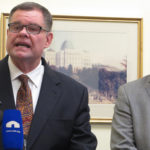Lawmakers in Nepal rejected an effort to declare the Himalayan nation a Hindu state, adopting a new constitution Sept. 14 defining Nepal as a secular republic but retaining a controversial anti-conversion clause.
Elijah BrownElijah Brown, chief of staff with the 21st Century Wilberforce Initiative, had spearheaded an international coalition—with significant Baptist involvement—calling on Nepal’s 601-member Constituent Assembly to reject language in the constitution that criminalizes “any act to convert another person from one religion to another.”
“The 21st Century Wilberforce Initiative is grateful that over two-thirds of the lawmakers in the Constituent Assembly of Nepal resisted significant efforts to constitutionally enshrine Hinduism as a defining national identity,” said Brown, a former professor at East Texas Baptist University.
However, he expressed disappointment the constitution retained Section 31(3), which says: “No one shall behave, act or undertake activities that breach public order or break public peace/peace in the community; and no one shall attempt to change or convert someone from one religion to another, or disturb/jeopardize the religion of others, and such acts/activities shall be punishable by law.”
Brown expressed concern “that this section contains the groundwork for future restrictions and discrimination.”
 Even so, other sections of the constitution include religious liberty protections for citizens, and he voiced hope those sections will take precedence in constitutional interpretation.
Even so, other sections of the constitution include religious liberty protections for citizens, and he voiced hope those sections will take precedence in constitutional interpretation.
“We remain hopeful that the courts in Nepal will read Section 31(3) in a limited fashion and choose instead to focus on Section 31(1) and Section 31(2), as well as to the introduction to the constitution, all of which promote the right to religious freedom for all citizens,” he said. “We call upon the people of Nepal, in particular the courts, to continue to build a country that allows for people of all faiths to live in peace and well-being.”
At least in the short term, Nepal remains far from peaceful. Hindu activists protested the vote to declare Nepal a secular state, and some evidence reportedly linked explosions outside churches to Hindu extremist groups.
“Our ongoing prayers and support for the country of Nepal remain essential, as earlier this week, Hindu radicals are suspected of detonating four bombs outside three churches in the capital Kathmandu in seeming opposition to the declaration that Nepal is to be a secularly defined nation,” Brown said.
Sign up for our weekly edition and get all our headlines in your inbox on Thursdays
About 80 percent of the people in Nepal are Hindu. The 5.6 million non-Hindus in Nepal include about 17,000 Baptists in 167 established churches—with more than 20 members—and 250 fellowships—congregations with fewer than 20 members.
 Both the international coalition organized by the 21st Century Wilberforce Initiative and a group of 25 members of the U.S. Congress who wrote protesting the anti-conversion clause in Nepal’s constitution insist it violates Articles 18 and 19 of the Universal Declaration of Human Rights, as well as the International Covenant on Civil and Political Rights.
Both the international coalition organized by the 21st Century Wilberforce Initiative and a group of 25 members of the U.S. Congress who wrote protesting the anti-conversion clause in Nepal’s constitution insist it violates Articles 18 and 19 of the Universal Declaration of Human Rights, as well as the International Covenant on Civil and Political Rights.
Three days before the Constituent Assembly of Nepal voted, two Texas Congressmen joined 23 of their colleagues in urging Secretary of State John Kerry to call on Nepal to strike the ban on conversion from its constitution.
Bill Flores, R-Bryan, and Jeb Hensarling, R-Athens, signed a letter urging Kerry “to work through diplomatic channels and to coordinate with regional allies and the United Nations to call upon the government of Nepal to ensure that its new constitution protects the rights of religious minorities.”
Congressman Brad Wenstrup, R-Ohio, spearheaded the effort to enlist congressional opposition to a constitutional provision that seemed to “endorse discrimination against historically marginalized communities and would make illegal an individual’s choice to change religions or to explain one’s religion publically—all violations of Nepal’s international agreements,” as the letter stated.
“During his visit to India, President Obama spoke about the need to protect the right of all people to freely ‘profess, practice and propogate’ their religion and warned against national divisions based on religious faith,” the letter said. “We ask you to deliver a similar message to the government and political parties of Nepal.”
Several weeks ago, the 21st Century Wilberforce Initiative sent a letter signed by 350 individuals from a dozen countries to Nepal President Rambaran Yadav, Prime Minister Sushil Koirala and members of the nation’s Constituent Assembly.
The letter urged Nepal’s elected officials to reject language in a draft of the constitution that “nullifies and criminalizes the freedom to share, change and choose one’s religion.”
“We seek to stand in solidarity with the diverse religious and ethnic minorities which represent the fullness of the country of Nepal and who want to be assured that their concerns and interests as citizens are properly represented in the draft constitution currently under consideration,” the letter stated.
Members of the BREAD—Baptist Relief and Development—Network, including representatives of Texas Baptists’ Christian Life Commission and BMS World Mission in England—worked closely with the 21st Century Wilberforce Initiative in drafting the letter and enlisting people to sign it.
The 21st Century Wilberforce Initiative is a human rights organization based in Falls Church, Va., led by former Baptist General Convention of Texas Executive Director Randel Everett.













We seek to connect God’s story and God’s people around the world. To learn more about God’s story, click here.
Send comments and feedback to Eric Black, our editor. For comments to be published, please specify “letter to the editor.” Maximum length for publication is 300 words.